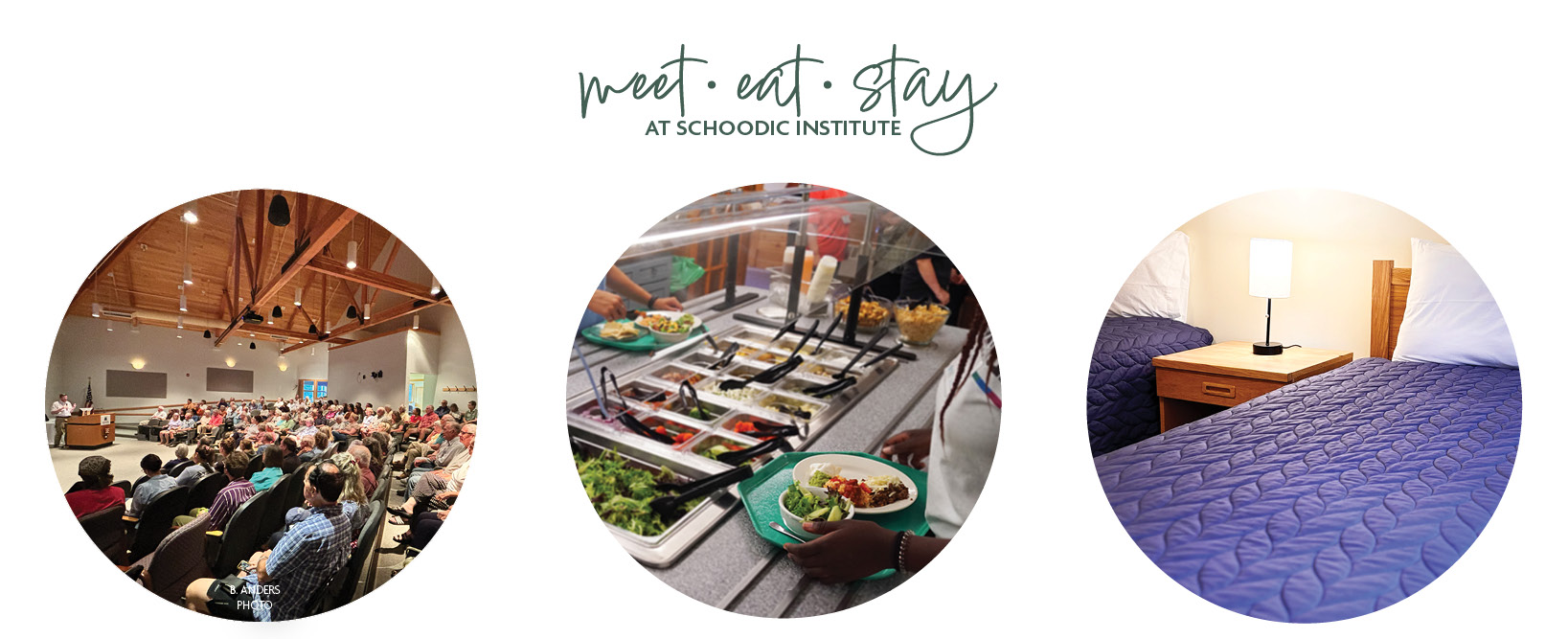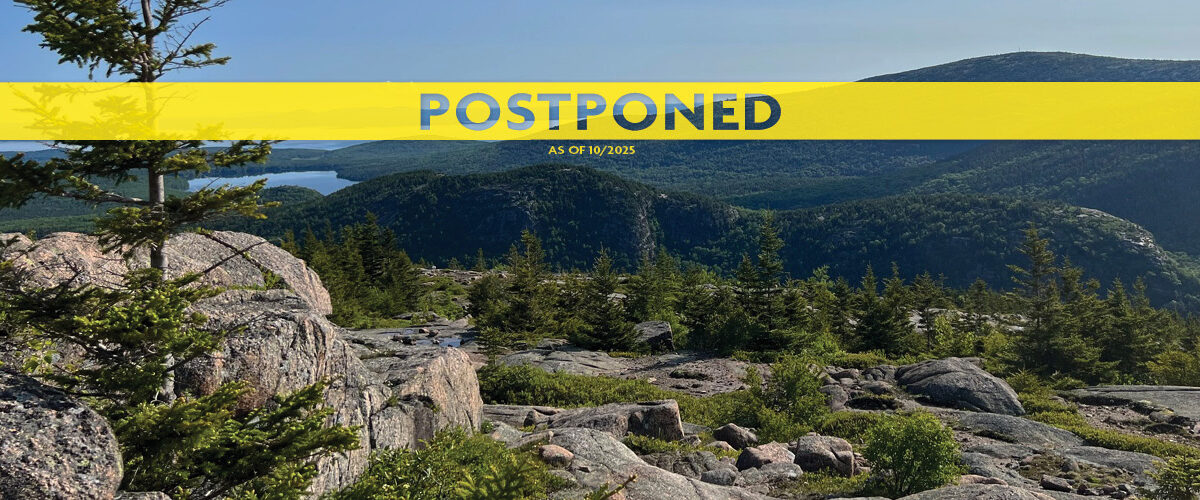Unfortunately, due to the lapse in federal government appropriations, the 2025 Acadia National Park Science Symposium has been postponed.
Although the current government shutdown presents many challenges, especially with the absence of our valued partners at Acadia National Park, our work at Schoodic Institute continues. We remain committed to advancing science in and beyond Acadia, and we look forward to reconnecting soon.
Please stay tuned to our website and social media for future updates on the Science Symposium, as well as our science. Thank you for your understanding and support.
Hosted by Schoodic Institute and the National Park Service, the Acadia National Park Science Symposium provides a forum to learn about science taking place in the region and to interact and build collaborations with scientists, educators, students, park staff, and others working in a range of fields. The theme of this year’s symposium is wildlife.
The symposium will take place in-person at Moore Auditorium on the Schoodic Institute campus (Winter Harbor, ME) and online via Zoom. This virtual option is open to speakers and attendees alike. Your registration for in-person attendance includes morning coffee and pastries, lunch, full access to our morning and afternoon poster sessions and speaker sessions, and more. Interested in staying overnight at Schoodic Institute? Scroll down to learn more, or add on your desired night stay via the registration form below.
The 2025 symposium agenda (POSTPONED):
Tuesday, October 7 (virtual): What Drives Early-Career Environmental Science Professionals? Why do we do this work? Gain insights as they present their perspectives in a series of ten-minute lightning talks. Learn more here.
Thursday, October 16 (in-person and virtual): A full day of symposium events, including speaker sessions, networking opportunities, poster sessions, and lunch at Schooner Commons (included in registration). Learn more here.
Joining us in-person at Schoodic Institute and interested in saving on your commute or extending your stay in the Schoodic Section of Acadia National Park? Just add on your desired stay, plus any additional meals crafted in-house by Schoodic Institute’s Food Service Team, via the registration form above. Staying at Schoodic Institute supports science, education, and conservation in Acadia.

You can view the video recording of the 2024 Science Symposium below.
2023 Symposia
Restoration in Acadia National Park and Beyond
The 2023 agenda:
Wednesday, October 11th from 10am – 12pm (online only): What Drives Early-Career Environmental Science Professionals? Gain insights from their perspectives as they share their inspirations in a series of 5-minute lightning talks. Attend online via Zoom.
Tuesday, October 17th from 7pm – 8:30pm (in-person and online): Keynote speakers Bill Zoellick and Mike Pinkham on Community Science: Building the Capacity to Adapt to Change. Attend in-person at Moore Auditorium on the Schoodic Institute campus or online via Zoom.
Wednesday, October 18 from 8:45am – 4:00pm (in-person and online): Enjoy a full day of symposium events, including three speaker sessions focused on salt marshes, Indigenous science, and moving forward, as well as two poster sessions and lunch. Attend in-person at Moore Auditorium on the Schoodic Institute campus or online via Zoom.
2022 Symposia
Research in Acadia Then & Now
The 2022 agenda:
Bass Harbor Head and coastal forests
Bik Wheeler, NPS, Acadia National Park
Jay Wason, University of Maine
John Daigle, University of Maine
Otter Cliffs, Schoodic Peninsula, and the intertidal
Seth Benz, Schoodic Institute at Acadia National Park
Chris Petersen, College of the Atlantic; Hannah Webber, Schoodic Institute at Acadia National Park; Durlin Lunt, Town of Mount Desert
Frenchman Bay’s marine ecology
Michelle LaVigne, Bowdoin College
Lauren Ross, University of Maine
Chris Sockalexis, Tribal Historic Preservation Officer, Penobscot Nation
Stephanie Spera’s pre-symposium lecture is available here.
Supplemental materials:
Posters and proceedings are available here. (National Park Service)
Intertidal Research in Acadia
Wednesday, March 2, 2022
This daylong virtual session included four panels of invited speakers covering National Park Service priorities, broad-scale research across the intertidal, and research specific to the rocky intertidal and soft sediment intertidal zones.
Draft Agenda (PDF version)
Presentation on evaluation of Acadia intertidal zone workshops to date (link to recording)
Visitors to Acadia (link to recording)
Tuesday, February 22, 2022
This session featured presentations by Laura Cohen, Acadia National Park Visitor Experience and Education, and Adam Gibson, Acadia National Park Social Scientist.
2021 Symposia
Early Career Opportunities in Acadia National Park
Thursday, December 9, 2021
The Resist-Accept-Direct (RAD) framework helps managers make informed, purposeful choices about how to respond to the trajectory of environmental change and supports collaborations across large landscapes. This symposium will feature speakers discussing RAD-informed projects in two national parks, and will include Indigenous perspectives from both areas. After the presentations, breakout group discussions will address questions to help identify obstacles to making RAD decisions and practices that may help managers and researchers use this approach at other locations.
Featuring:
- Status of RAD thinking in NPS, Gregor Schuurman, National Park Service, Climate Change Response Program
- Examples in Acadia National Park, Abe Miller-Rushing, National Park Service, Acadia National Park, and Nick Fisichelli, Schoodic Institute at Acadia National Park
- Wabanaki perspectives on climate adaptation, Darren Ranco, University of Maine
- Examples in Bandelier National Monument, Scott McFarland, National Park Service, formerly at Bandelier National Park (currently at NPS Natural Sounds and Night Skies)
- Pueblo perspectives on climate adaptation, Kai-t Blue-Sky, Pueblo of Cochiti
Link to recording and supplemental materials:
Resist-Accept-Direct (RAD)—A Decision Framework for the 21st-century Natural Resource Manager (National Park Service)
Announcing the Resist-Accept-Direct framework (Schoodic Institute)
National news coverage of the RAD framework (Schoodic Institute)
2020 Symposia
An overview of research in the park in 2020
Monitoring change in Acadia National Park
Workshop: Early career opportunities and internships in Acadia
Adapting to the Future
Wabanaki knowledge, perspectives, and science in Acadia
Workshop on research permits, reporting, data sharing, and science communication
Past Symposia
2018 Acadia Science Symposium Proceedings and Presentations.

